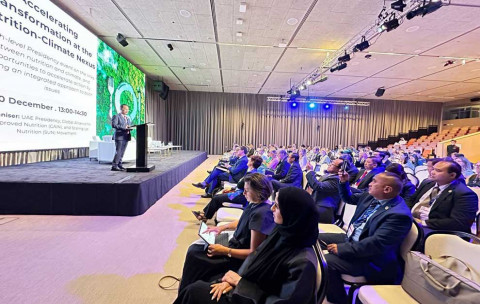
Environment ministry secretary of state Chuop Paris speaks to reporters. Kim Sarom
A senior Ministry of Environment official has explained that although Cambodia is a low emitter of greenhouse gases, it is committed to contributing to climate change action.
Chuob Paris, ministry secretary of state, highlighted the commitment as he addressed the December 22 opening ceremony of a three-day climate change workshop in Battambang province. The workshop, held at the provincial environment department headquarters, aimed to raise awareness of the issue with journalists.
He explained that the ministry is implementing the “Circular Strategy on Environment 2023-2028”, which sets out three priorities for the direction of the Kingdom’s development: it must be clean, green and sustainable.
Paris said that cleanliness and public health are issues which the seventh mandate government of Prime Minister Hun Manet is paying close attention to, and the ministry is playing its part by reducing plastic waste, particularly among the young. The long-term vision is to create a Cambodia where communities, waterways and natural resource areas are free from plastic waste pollution.
“The preservation of the forests is an important driver for the elimination of carbon emissions, and we aim to ensure that Cambodia becomes a carbon absorber by 2050, which will offset residual emissions from other sectors,” he added.
He described a ministry reforestation campaign which will provide at least one million seedlings to the public each year, with the goal of increasing the Kingdom’s forest cover by 60 per cent by 2050. This will also improve people’s livelihoods, as they benefit from sustainable, natural resource conservation.
The three-day workshop ran from December 22 to 24, and was attended by 30 journalists from radio and television stations, magazines, electronic newspapers, print media and online media.
Supported by the Cambodia Climate Change Alliance – a multi-donor initiative funded by the EU, Sweden, and the UNDP with a comprehensive and innovative approach to address climate change in Cambodia – the forum aimed to increase the awareness of the media, and thus the public, so they will better understand the action the government is taking in response to climate change.
Reporter Sul Ravi, one of the participants, found the workshop very useful, noting that he considers the role of a journalist to be an informant.
“This event encouraged journalists to understand climate change and the important activities of the Ministry of Environment, which is working on this task,” he said.




















